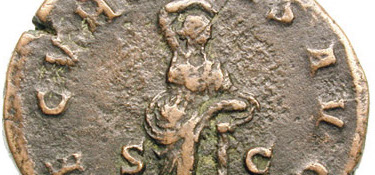Laughing with tears (but not in the way you think), or: Introducing our Epigram of the Month series
With several thousand items of evidence that we deal with in the MAPPOLA project, studying the treasure trove that is the verse inscriptions of the Roman empire, we encounter fascinating, mesmerising, thought-provoking, sometimes truly astonishing pieces of verbal art on a daily basis.
These pieces are just too good not to share.
And thus an idea was born: let’s create a little series and introduce our ‘epigram of the month’. For this, our team members will take turns introducing those little gems that they encountered as part of their work on the project.
Our first Epigram of the Month, for October 2020, kicking off this new series, was selected by Prof. Peter Kruschwitz.
Death is a grave matter. (… groan … I know, I know …)
Piety, tact, and respect are values commonly associated with funerary commemoration, even life’s many little ironies might suggest a different approach at times. This, on average, also holds true for the instances of funerary commemoration that we can study from the Roman world.
But not everyone got the memo – and one such instance is the delightfully disturbing, and disturbingly delightful, epitaph for Honorata and Valerius Italicus, a lady of eighty years and her little, ill-fated grandson, created by one Valerius Iulianus.
Discovered in the city of Rome in a dwelling near the arch of Gallienus, now preserved in the Archaeological Museum of Naples, the text I chose to launch our series has been inscribed on a marble tablet (36 x 52 cm), datable to the second or third century A. D.
The piece reads (and translates) as follows (CIL VI 28047 (cf. p. 3535) = CLE 1128, EDR142973, click here for an image of the inscription):
Securitati sacr(um).
Valerius Iulianus Italico filio infelicis-
simo et Honoratae mammulai huius fec(it).
dispar damna lege Parkar[u]m et stamina dispar:
haec ridenda mihi est, hic lacrumandus erit.
haec namque emeritos bis XXXX per annos
uixit, ad hic tertio consule natus obi(i)t.
cur modo iam praeceps, iterum tam sera fuisti,
funeris amborum, dic, rea, Persephone?
uix lucem uidisse satis qui uiuere posset,
uiuere quae nollet uix potuisse mori.
Sacred to Securitas.
Valerius Iulianus had this made for for his most ill-fated son Italicus and for Honorata, his (i. e. Iulianus’) lil’ mummy.
Read of unequal loss and the Fates’ unequal (allocation of life-)threads:
At her I must laugh, for him one must cry,
For she lived through a stretch of twice forty years of service,
Whereas he died when he was born just two consuls ago.
Why have you first rushed, and then been so late,
Tell me, Persephone, as you stand accused of the death of both of them:
He who might have lived barely saw the light,
She who had no desire to live, barely managed to die.
As already stated, Valerius Iulianus, otherwise unknown, commemorates his mother Honorata (who had died at the age of 80) and his son (Valerius) Italicus (who died at the age of two and a bit, tertio consule, under a third consulship, i.e. with only three sets of consuls that he ever got to encounter during his regrettably short life).
Following a dedication to Securitas (line 1), two lines of prose elucidate the burial arrangements (lines 2–3). After that, there follows a poem of eight lines – a poem composed in elegiac distichs, with line and verse breaks coinciding (lines 4–11).
The inscription’s layout supports the internal structure of the text that it preserves: the dedication to Securitas is centred, and the first lines of the second and third elements, respectively, are clearly marked as beginnings of new paragraphs through their being outdented to the left: a common device in Latin inscriptions.

Securitas, literally the absence of worries and concerns (se + cura), was a deified concept which gained some relevance and traction as the Empire progressed (image source: click here)
It – she – represents stability and safety in uncertain times, iconographically translated into epithets such as a staff to lean on.
An uncommon, and thus remarkable, choice for a dedication in a funerary inscription.
But – and that is what really struck me – there are several further uncommon aspects to this inscription:
First, we meet a man calling his mother mammula. Mammula is a term of endearment, given in its diminutive form, which quite literally translates as ‘little boob’, ‘little teat’: a term of endearment, for sure, yet one that clearly originates from the vocabulary of a little child, applied here, by a grown man, to a deceased octagenarian.
Secondly, and more interestingly still, however, the very same man who, in the prose part, was keen to display such affectionate, intimate language for his mother, is perfectly willing to sacrifice her dignity for a purely comedic effect, accompanied by a verbal and stylistic fireworks.
At the age of eighty, the author suggests, Honorata’s death was overdue. She had done her duty (emeritos … annos), and she was already sick of her life (uiuere quae nollet, line 11). Yet, by some twist of fortune, she was unable to let go of it – ironically, the exact opposite of her grandson, Italicus, who was unable to cling on to life at an age when a bright future supposedly lay ahead of him.
Dispar, dispar, unequal, unequal (line 4)!
What on earth was Persephone thinking, Valerius Iulianus asks purely for rhetorical effect, when she was stalling the death of the aged (grand-)mother, after rushing the death of the young boy?
Italicus’s death, Valerius Iulianus says, must be met with tears (lacrumandus!). That of aged Honorata, in turn, ought to be met with laughter (ridenda!).
But, really, what was there to laugh about?
Relief that the mother finally found the peace she deserved after a long life?
Or the fact her death evidently provided an opportunity for a rhetorically delightful poetic exercise in morbid humour…?
Securitas only knows!

